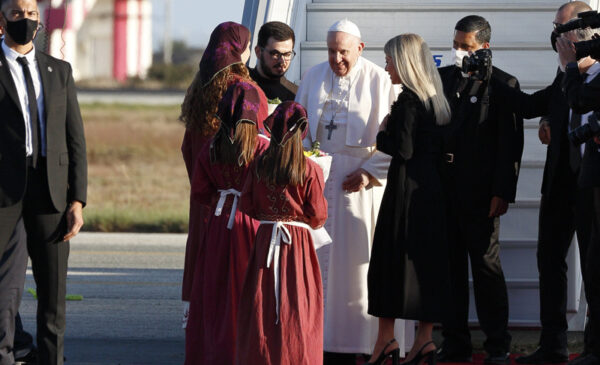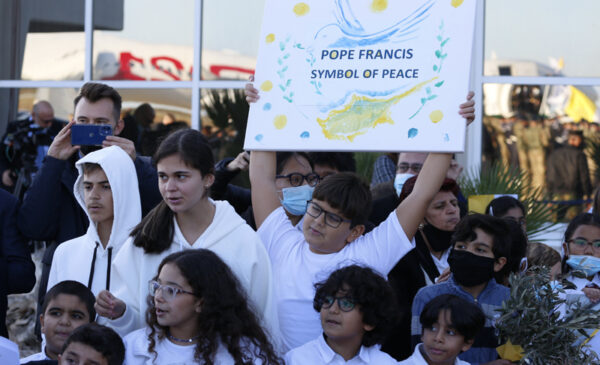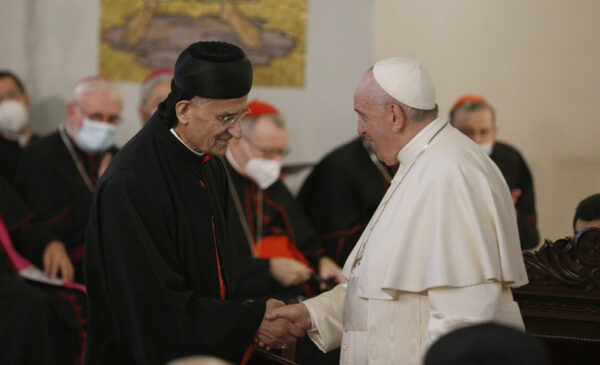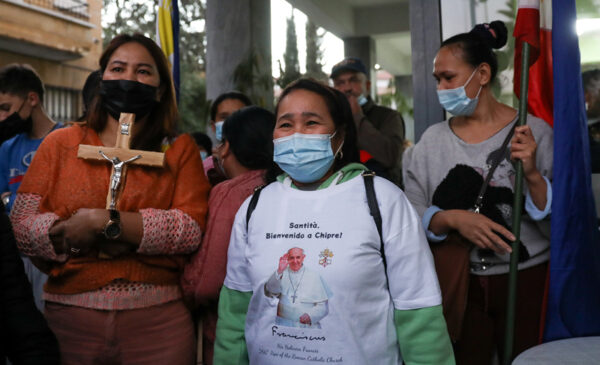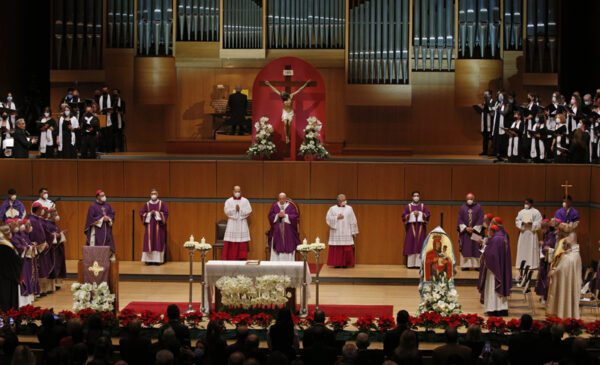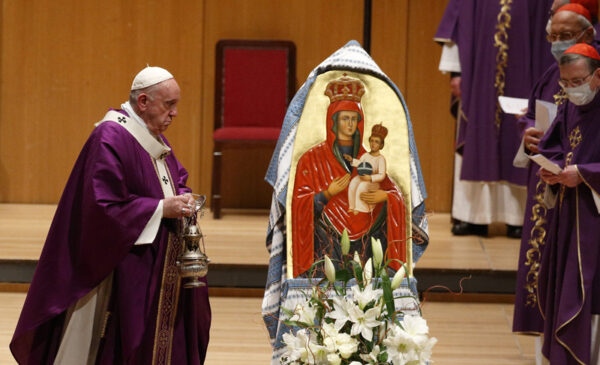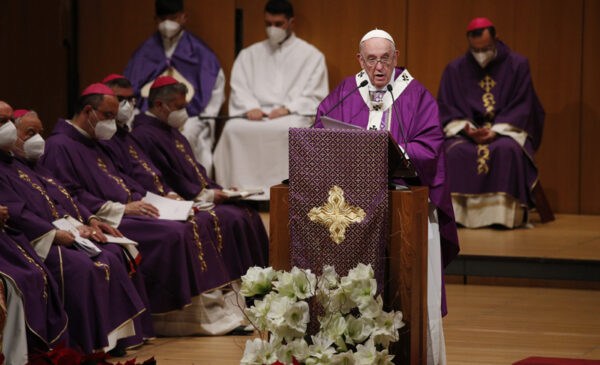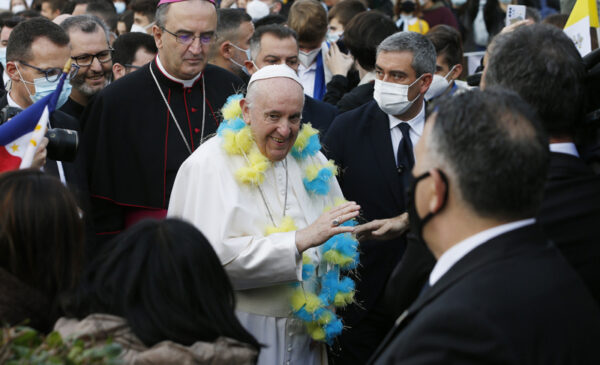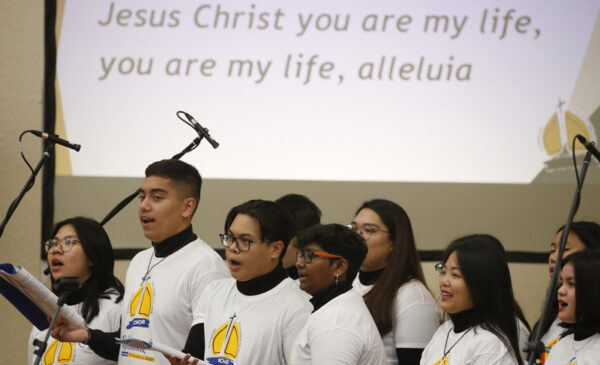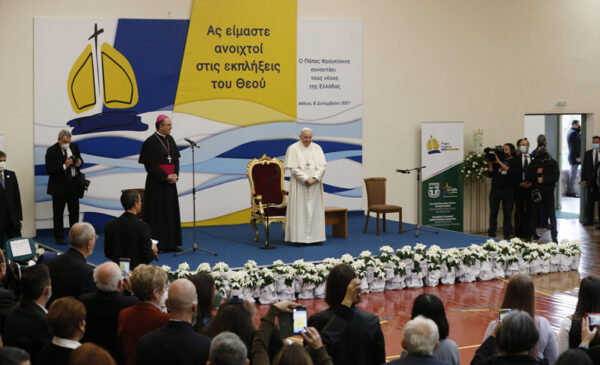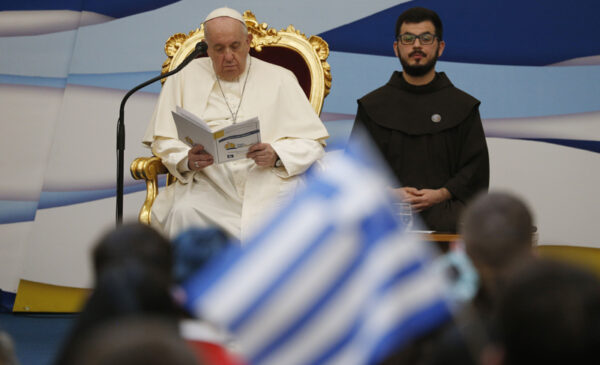By Elise Ann Allen, Special to The Tablet
ROME — When Pope Francis was in Greece and Cyprus this weekend, he sent some very clear messages to Europe and the West in general, warning about what he sees as the weakened state of democracy due to a rising nationalist sentiment and chastising the global community for its indifference to migrants.
Given the core underlying themes, this trip was one close to the pope’s heart, as the global migration crisis, the state of Europe, and the strength of the European Union have been key concerns of his from the beginning.
During his first trip outside of Rome just months after his election in March 2013, Pope Francis visited the Italian island of Lampedusa, which is the main arrival point for migrants crossing from Libya to Italy, where he called the Mediterranean a “cemetery,” paying homage to the thousands of migrants who have lost their lives in attempts to reach a better life.
When receiving the prestigious Charlemagne Award in May 2016, Pope Francis used forceful language to describe the state of Europe, calling the Old Continent a “grandmother” and describing it as a “weary and aging Europe, no longer fertile and vital, where the great ideals that inspired Europe seem to have lost their appeal.”
For Pope Francis, the migrant issue and the deterioration of Europe have often gone together, as he frequently criticizes European Union nations for closing their borders to migrants, arguing that Europe has forgotten its roots and its history as a hospitable place of welcome to strangers. His Dec. 2-6 trip to Cyprus and Greece was no exception.
While there, the pope chastised the global community for their “indifference” to the plight of migrants and refugees and said the wave of nationalism sweeping across Europe has not only weakened democracy but has placed national interests over the common good and dignity of the human person.
Pope Francis landed in Cyprus on Dec. 2, where he met with political and civil authorities as well as the Orthodox Archbishop of Cyprus, Chrysostomos II; spoke to Catholic priests and religious serving on the small island; and held an ecumenical prayer service with migrants and refugees. During his Dec. 4-6 visit to Greece, the pope also met with political and civil authorities and visited with Orthodox Archbishop Ieronymos II of Athens and all Greece, spoke with members of the country’s small Catholic community, met with young people, and he also paid a visit to the island of Lesbos on Sunday.
Pope Francis’s visit to Lesbos marked the second time he has traveled to the island, having made an initial visit in 2016 after which he brought a dozen Syrian Muslim refugees back with him on his return flight to Rome.
Migration
One of the most glaring examples of the pope’s desire to highlight the migrant crisis during the trip was an announcement from the Cypriot government that the Vatican was helping to relocate some 50 migrants living on the island to Rome, once their paperwork is in order.
While he offered a strong message of reconciliation to Cyprus, which since 1974 has been bisected by a so-called “Green Line” dividing the island between the Greek Cypriot south and the Turkish controlled north, his most passionate appeal came in his address to migrants Friday. During that address, the pope lamented the fact that migrants often face the unspeakable in their journeys to Europe, saying, “women are sold, men are tortured and enslaved.”
This often happens after “they were pushed back” by the so-called “civilized society” in the West, he said, telling the migrants that when he looks at them, he sees “the suffering of the journey, so many who have been kidnapped, sold, exploited.
“We lament when we hear about the [crimes under the Nazis and Stalin]. How could it happen? Brothers and sisters, it is happening today! On shores nearby,” he said, calling the prejudice migrants often face “a poison” and a “twisted mindset” that is hard to let go of.
Similarly, while he was in Greece visiting a migrant reception center in Lesbos, Pope Francis said he chose to come to the island again “to see your faces and look into your eyes. Eyes full of fear and expectancy, eyes that have seen violence and poverty, eyes streaked by too many tears.”
Pope Francis noted that the global community has joined forces and is working tirelessly to develop and distribute anti-COVID vaccines, and that progress, however slow, is being made in the fight against climate change, which was recently the subject of a United Nations leaders’ summit in Glasgow.
“All this seems to be terribly absent when it comes to migration. Yet human lives, real people, are at stake,” he said, adding, “When we reject the poor, we reject peace.”
Linking the migration problem to what he sees are da
Europe
While he was in Cyprus, the pope’s migrant agenda was on full display; once he landed in Greece Saturday it became clear that he also had a strong message for Europe, including an indictment of the current state of affairs and a warning about where the continent is headed.
In his opening speech to Greek authorities on Dec. 4, Pope Francis offered his own evaluation of the West, arguing that democracy is waning beneath the rise of a nationalist sentiment devoid of the solidarity that was so characteristic of the Old Continent’s roots.
Speaking of the current state of Europe in light of the broader global landscape, the pope said “we are witnessing a retreat from democracy” in general, due to both a lack of participation and a growing skepticism toward institutions.
The challenges Europe faces require “concrete and active cooperation,” he said, insisting that the international community also needs this “in order to open up paths of peace through a multilateralism that will not end up being stifled by excessive nationalistic demands.
He cautioned that, “the European Community — prey to forms of nationalistic self-interest — rather than being an engine of solidarity, appears at times blocked and uncoordinated.
“In the past, ideological conflicts prevented the building of bridges between Eastern and Western Europe; today the issue of migration has led to breaches between South and North as well,” the pope said, calling for a global, “communitarian vision” with the commitment of all.
On the papal plane back to Rome, the pope touched on the issue of Europe again, saying he sees two clear threats to democracy: populism and the retreat from traditional European values aimed at the common good. Populism “is starting to show its nails,” he said, insisting this trend has nothing to do with “popularism, which is the expression of a nation’s identity, folklore, value.”
Rather, populism is a system in which national values are sacrificed and watered-down “in favor of a government that goes beyond national interests,” he said, adding, “We shouldn’t water down our identity for national gain.”
Overall, while strengthening relations with the Orthodox was also a priority, Pope Francis’ main agenda in Cyprus and Greece was overwhelmingly to attempt to move the needle on the migration issue, and to issue a warning, if not to stifle, the growing nationalist sentiment which he believes is threatening the EU and indeed the West as a whole.
Whether the pope’s advocacy and warnings will be heeded by leaders is yet to be seen; however, Pope Francis seems intent on using whatever platform he has to ensure these issues are not forgotten.

